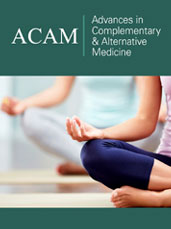- Submissions

Abstract
Advances in Complementary & Alternative medicine
Safety and Efficacy of Orally Administered Full-spectrum Medicinal Cannabis Plant Extract 0.08% THC (NTI164) in Children with Autism Spectrum Disorder
-
Open or CloseDima El Sukkari1, Kanan Sharma1, Bobbi Fleiss2, Dion L Braganza1, Brooke A
Keating3*, Yelda Ogru3, Esra Isikgel3, Alison Crichton4,5 and Michael C Fahey1
1Monash Children’s Clinical Trial Centre, Monash Children’s Hospital, Clayton, Victoria, Australia
2Health and Biomedical Sciences, RMIT University, STEM College, Bundoora, Victoria, Australia
3Fenix Innovation Group, Mount Waverley, Victoria, Australia
4Department of Paediatrics, Monash University, Clayton, Victoria, Australia
5School of Clinical Sciences, Monash Medical Centre, Clayton, Victoria, Australia
*Corresponding author:Brooke A Keating, Fenix Innovation Group, Mount Waverley, Victoria, Australia
Submission: March 06, 2025;Published: March 21, 2025

ISSN: 2637-7802Volume8 Issue4
Abstract
Autism Spectrum Disorder (ASD) is commonly associated with debilitating comorbidities impacting the wellbeing of affected children, young people and their families. Many children with ASD and behavioural problems do not respond well to available medications and may experience adverse side effects. Therefore, it is crucial to develop alternative safe and effective therapies. The improved understanding of the endocannabinoid system, together with emerging evidence for the therapeutic effects of cannabis derivatives in neurodevelopment disorders, has led to an exploration of their use in ASD. This singlegroup, open-label study assessed the safety and efficacy of a novel oil-based full-spectrum medicinal cannabis plant extract 0.08% Δ-9-Tetrahydrocannabinol (THC) (NTI164) in treating 14 children and young people with ASD symptoms (mean age 13.4 years, range 10-17). Data on the safety profile of NTI164 was collected through biochemical analysis, vital signs, and parent/caregiver and participant reports. The efficacy was assessed through a dose-escalation protocol using a broad range of validated clinical behavioural assessments, caregiver, and participant-reported questionnaires. Following 4 weeks of treatment with NTI164, 93% of participants demonstrated significant overall improvement in ASDrelated symptoms compared to baseline, with transient side-effects that did not interfere with their general functioning. In addition, targeted behavioural problems were rated as “much improved” or “very much improved” in 46% of treated patients. More than half of caregivers and participants also reported decreased anxiety symptoms. The findings from this study suggest that NTI164 is well-tolerated and safe, with potential clinical benefits in improving disruptive behaviours and reducing anxiety in young people with ASD-related symptoms. Future longitudinal and well-controlled studies are warranted to develop evidence-based clinical therapies and further evaluate the therapeutic benefit of full-spectrum cannabis extracts in managing ASD core and associated comorbid symptoms.
Trial registration number NCT05516407
Keywords:Anxiety; Autism spectrum disorder; Cannabidiol; Cannabis; Cannabinoids; Δ-9- Tetrahydrocannabinol; Inflammation
Abbreviations:AEA: Anandamide; AEs: Adverse Events; ADOS-2: Autism Diagnostic Observational Schedule; ALT: Alanine Aminotransferase; ASC-ASD-C: Anxiety Scale for Children- Autism Spectrum Disorder-Child; ASC-ASD-P: Anxiety Scale for Children-Autism Spectrum Disorder-Parent; ASD: Autism Spectrum Disorder; AST: Aspartate Aminotransferase; CBD: Cannabidiol; CBDA: Cannabidiolic Acid; CBDV: Cannabidivarin; CBGA: Cannabigerolic Acid; CB1/2: Cannabinoid Receptor ½; CGI-C: Clinical Global Impression-Change of Target Behaviour; CGI-CA: Clinical Global Impression-Change in Attention; CGI-I-C: Clinical Global Impression- Improvement-Clinician; CGI-I-Ca: Clinical Global Impression-Improvement-Caregiver; CGI-S: Clinical Global Impression-Severity of Illness; ECS: Endo Cannabinoid System; MCH: Monash Children’s Hospital; NTI164: Full-Spectrum Medicinal Cannabis Plant Extract With 0.08% THC; SD: Standard Deviation; SEM: Standard Error of the Mean; SDSC: Sleep Disturbances Scale for Children; TBL: Total Bilirubin; THC: Δ-9-Tetrahydrocannabinol; ULN: Upper Limit of Normal
 a Creative Commons Attribution 4.0 International License. Based on a work at www.crimsonpublishers.com.
Best viewed in
a Creative Commons Attribution 4.0 International License. Based on a work at www.crimsonpublishers.com.
Best viewed in 







.jpg)






























 Editorial Board Registrations
Editorial Board Registrations Submit your Article
Submit your Article Refer a Friend
Refer a Friend Advertise With Us
Advertise With Us
.jpg)






.jpg)














.bmp)
.jpg)
.png)
.jpg)










.jpg)






.png)

.png)



.png)






